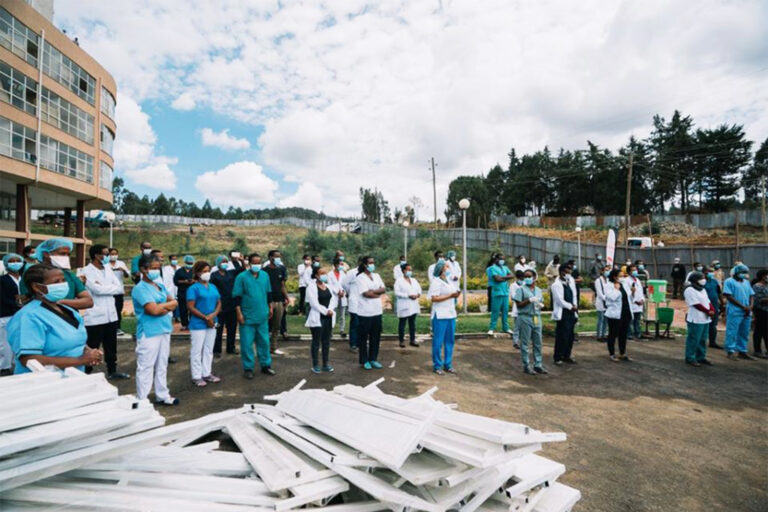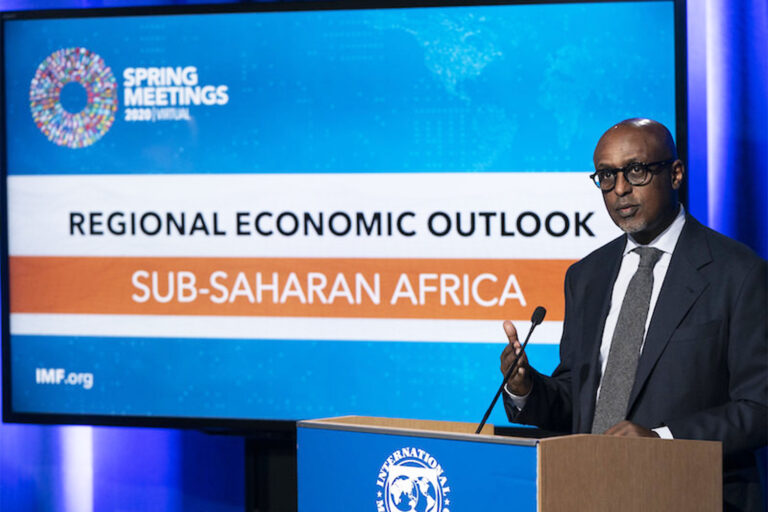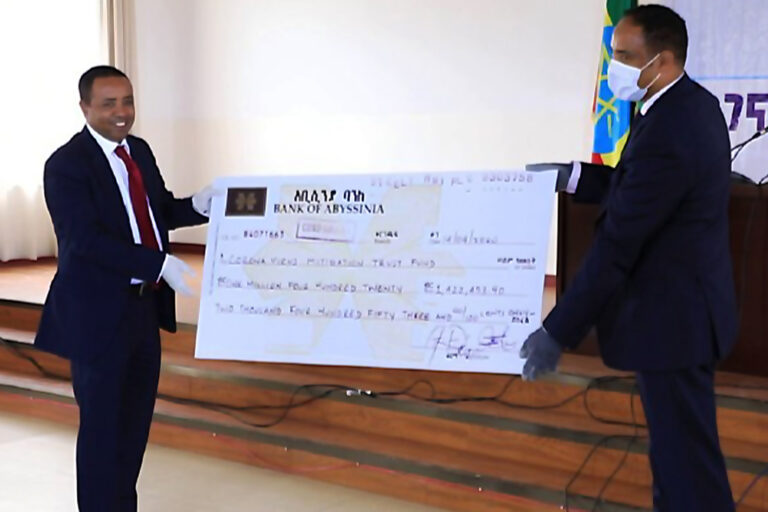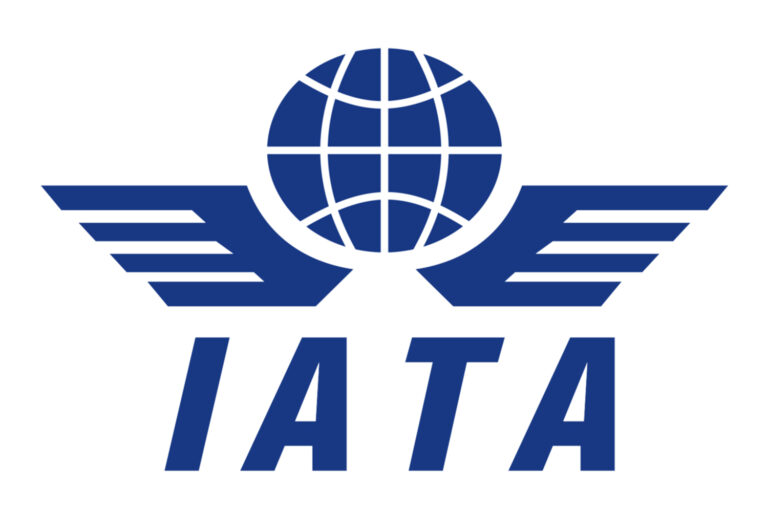Healthcare professionals that are in the forefront of the fight against COVID-19 will be provided with life insurance by Ethiopian Insurance Corporation.
The government has reached an agreement with the Ethiopian Insurance Corporation to buy life insurance for health professionals that are in direct contact with Covid-19 patients.
“The insurance company disclosed the agreement by their own initiative,” said Lia Tadesse Minister of Health. According to the Minister, the life insurance grant is aimed at encouraging health experts who are the most vulnerable to the deadly corona virus.
Certain works are in the making to disclose the value of the cover including registering health workers all over the country that are directly in contact with the Covid 19 cases.
According to Lia, the insurance grant will also include members of the Rapid Response Team. “At a time of emergency the team may got accidents, and the insurance grant include to provide this insurance,” Lia added.
The two sides are expected to sign an agreement in few days to make the insurance grant legal.
As Covid-19 cases continue to rise in Ethiopia, several doctors, nurses and other health workers in emergency rooms remain at high risk. The ministry has said that the government is working to provide incentive package for health workers.
“There are two selected hospitals fully accommodated with materials to give treatment for health workers,” Lia said.
The Ministry of Health is also preparing temporary residential houses for health workers.
“Health workers are at the front line of the COVID-19 outbreak response and as such are exposed to hazards that put them at risk of infection. Hazards include pathogen exposure, long working hours, psychological distress, fatigue, occupational burnout, stigma, and physical and psychological violence,” says the World Health Organization (WHO).
The organization has a guideline set of rights of health workers, including the specific measures needed to protect occupational safety and health, Necessary preventive and protective measures should be taken to minimize risks.
Such rights include, provide adequate personal protective equipment, IPC and PPE supplies including masks, gloves, goggles, gowns, hand sanitizer, soap and water, cleaning supplies in sufficient quantity to those caring for suspected or confirmed COVID-19 patients, such that workers do not incur expenses for occupational safety.
The pandemic virus Covid-19 is surprising the world with its high spread. The increasing number of confirmed cases from day to day is running high and it is taking lives of hundreds of thousands each day.
Due to the spread of virus in the world medical workers are more strained than ever.
Hence the country has lack of sufficient health professionals the government called on retired and intern health workers to register and join the national movement to mitigate the spread of the virus. According to Lia, more than 16,000 health workers has already registered so far and 693 has been employed by the federal government and more than 3000 by regional governments.
Ethiopia buys life insurance for health workers
IMF projects a recession for sub-Saharan Africa in 2020
The effect of global outbreak of COVID 19 will contract Ethiopia’s real GDP growth to 3.2 percent in 2020 the IMF Regional Economic Outlook predicts.
The country that in the past 15 years registered higher economic growth particularly in the involvement of public projects, is expected to be highly affected by the coronavirus pandemic that also put the sub Saharan Africa region on serious economic challenge.
The IMF Regional Economic Outlook published in October 2019 forecasted that the country’s real GDP growth will stand at 7.2 percent in 2020.
However as many other countries in the region because of the effect of the virus the economic growth will sharply decline by over half than the previous projection.
In the latest outlook published in relation with the joint spring meeting of the World Bank and IMF with member countries the real GDP growth of Ethiopia will be limited to 3.2 percent for the year.
Even though the growth rate projection for the year is lesser than the previous forecast it is still one of the biggest growth in the subcontinent.
According to the IMF projection in the sub continent the biggest economic growth will be registered by South Sudan, Benin, Uganda and Rwanda.
The latest outlook indicated that the stated countries real GDP growth will stand at 4.9 percent, 4.5 percent, 3.5 percent and 3.5 percent respectively and Ethiopia and Senegal will follow by 3.2 and 3 percentages respectively.
The sub continent regional outlook projection indicated that Ethiopia’s real GDP growth for the year 2021 will be at 4.3 percent that mean it will show slight improvement but it is very far compared with the previous growth path.
IMF Regional Economic Outlook published in October 2019 forecasted that Ethiopia’s government debt in 2020 will be 54.4 percent of the GDP from 59.1 percent in 2019. Meanwhile the latest projection increased the debt share of the GDP to 56.9 percent for 2020 and that will also reach 57.6 percent in 2021.
The overall fiscal balance including grants for the year 2020 will stand at -3 (negative three) percent.
The latest report added that Ethiopia’s external debt will jump to 29.9 percent in 2020 that was expected to stand at 28 percent of the GDP in the previous IMF projection.
In its recommendation IMF advise countries that fiscal, monetary, and financial policies should be used to protect vulnerable groups, mitigate economic losses, and support the recovery.
“Once the crisis subsides, fiscal positions should return to sustainable paths,” it said.
Ethiopia is allocating huge amount of resource to fight the spread of the virus besides the private sector, which is highly affected by the situation, which is putting its effort to mitigate the virus effect.
So far employers are ordered not to lay off their employees and real estate owners are also cutting office and shop rental fees that will have direct effect on the tax collection.
IMF stated that the real GDP in sub-Saharan Africa in general is projected to contract by −1.6 percent in 2020, the lowest level of growth on record. This is about 5.2 percentage points lower than envisaged in the October 2019 Regional Economic Outlook for Sub-Saharan Africa.
The sharp downward revision largely reflects the fallout from the spread of COVID-19 and lower-than-expected commodity prices. In addition, idiosyncratic factors, such as continued structural constraints (South Africa), policy adjustment (Ethiopia), and climate and other natural shocks (such as the locust invasion in eastern Africa) have also contributed to the downward revisions.
Century Mall donates 26 million birr for coronavirus fight
Century Mall and its sister companies’ has provided close to 26.2 million birr for the effort to fight the COVID 19.
The administration of the company that represented other sister companies such as Steely RMI besides the mall stated that the support is in cash and in kind.
In its statement Century Mall disclosed that from the different kind of donation 3.3 million birr worth of 1,500 quintal wheat flour is provided for Addis Ababa City Administration and Bishoftu City Administration.
From the stated amount of flour 500 quintal is provided for Bishoftu in a ceremony held on April 15 in the presence of the Mayor of Bishoftu City Administration, Alemtsehay Shiferaw.
The Mayor said that Steely RMI is a symbol on taking corporate social responsibility in the town that it provided several infrastructures including school, health facility and water for the community in Bishoftu.
She said that the current support for the society is very big in volume and that others should follow.
At the same day the company has provided the 1,000 quintal flour at the food bank at Exhibition Centre for the Addis Ababa city administration.
It has also provided one million birr cash for Ministry of Peace that is the hub for mobilizing national resource to fight COVID 19 in addition to donation of over 421 thousand birr collected from its employees and management staff of Century Mall and sister companies.
According to the statement the company sent to Capital it has decided to provide a four-storey building, which has 5.5 million birr annual rental revenue, for the government to use it until the current challenge is fully controlled.
The statement that appreciated the effort of health workers and the government to fight the global pandemic has also provided Toyota Land Curser with a driver and fuel cost for the government for unlimited period of time on the aim to transport health workers.
“Considering the effect of the virus on the economic activity of the country Century Mall has decided to cut half of the three months rental fee for 226 tenants that host shops, restaurants and cafeteria, supermarkets and other facilities in the building. The total rental fee cut is worth 16.2 million birr,” it added.
IATA deepens projected airline revenue loss to $314 billion
The International Air Transport Association (IATA) now forecasts airlines will lose $314 billion in passenger revenue this year amid the coronavirus outbreak, a deepening of $62 billion from its previous projection.
The new forecast equates to carriers’ 2020 passenger revenue being down 55% on 2019’s figure, and reflects worsening economic forecasts and predictions that the return to air travel is likely to be slower than previously expected.
The lower revenue in the new forecast is based on a projected 48% fall in traffic measured in RPKs for the full year, IATA states.
“We have never seen a downturn this deep before,” says IATA director general Alexandre de Juniac. ”In our latest scenario, full-year passenger revenues plummet 55% compared to 2019, while traffic falls 48%. In other words, half our business disappears. That’s catastrophic.”
IATA’s previous forecast – released on 24 March – predicted a $252 billion, or 44%, hit to passenger revenues and a 38% reduction in RPKs.
Most regions will see full-year RPKs down by around 50% year on year, IATA now predicts, with the North American sector being the outlier at around 36%.
The Asia-Pacific region accounts for $113 billion of the lost passenger revenue, followed by Europe with $89 billion and North America with $64 billion.
The airline body’s revision of its 2020 revenue projection was partly prompted by a steeper-than-expected reduction in worldwide flights leading into the second quarter, which IATA expects to be the height of the crisis. It had earlier forecast a fall in flights of around 65% year on year at that point, but by early April flights were down 80%, with the industry being “virtually grounded” aside from domestic markets in the USA and Asia.
Among its other revised considerations are a worsening economic outlook, including a projection that global GDP will fall by nearly 6% this year – twice as large as the contraction seen during the global financial crisis.
Amid that economic pressure, IATA expects the restart of travel in the second half of 2020 to be slower than previously forecast, driven in part by a slow return to international flights.
Domestic markets are forecast to return ahead of international markets, but will still be dampened by poorer-than-expected economic conditions.
IATA notes that while domestic markets accounted for 58% of passenger numbers in 2019, international flights accounted for 67% of traffic measured in RPKs – reflecting the latter’s importance to airlines.
The recession alone would push global RPKs down 8% in the third quarter, IATA notes, before travel restrictions and the confidence effects of the coronavirus outbreak are considered.
Even amid a recovery in traffic beginning in the third quarter, global RPKs are still predicted to be down 33% in the fourth quarter of this year.
IATA also notes that its revised assessment reflects a much deeper impact on markets in Africa and South America than previously expected.
Its forecast continues to be based on severe domestic travel restrictions lasting for the three months that make up 2020’s second quarter, with some curbs on international travel extending beyond that period.






